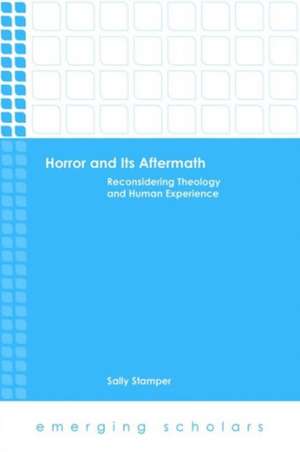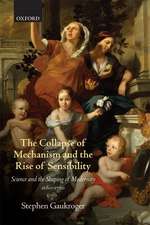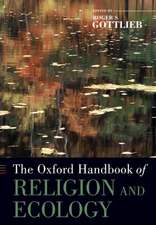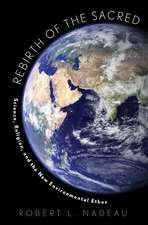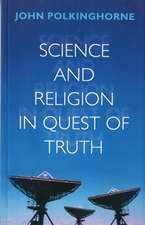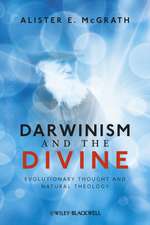Horror and Its Aftermath: Emerging Scholars
Autor Sally Stamperen Limba Engleză Paperback – 31 aug 2016
Theological anthropology often brings psychology to bear on the contingent nature of human existence in relationship to God. In this volume, Sally Stamper articulates one modern trajectory of theological recourse to psychology (comprising Schleiermacher, Nietzsche, and Tillich) as the ground on which she brings clinical psychoanalytic theory and early childhood studies into conversation with fundamental questions about the relationship of God to human suffering and its remediation. She develops her argument from the assertions that human experience evolves within an awareness of human vulnerability to profound suffering and that insight into consequent human anxiety is a powerful resource for soteriology, eschatology, and theological anthropology. Stamper narrates this normative anxiety by integrating object relations theories of early childhood development and critical readings of literary texts for young children. She gestures toward a new eschatological vision that poses the radical otherness of a transcendent God as key to divine remediation of human suffering, in the process building on Marilyn McCord Adams's soteriological response to human horror-participation and on Jonathan Lear's assertion of radical hope in response to catastrophic collapse of cultural resources for making meaning.
Din seria Emerging Scholars
-
 Preț: 342.54 lei
Preț: 342.54 lei - 19%
 Preț: 471.38 lei
Preț: 471.38 lei -
 Preț: 365.11 lei
Preț: 365.11 lei -
 Preț: 340.63 lei
Preț: 340.63 lei -
 Preț: 360.28 lei
Preț: 360.28 lei -
 Preț: 433.26 lei
Preț: 433.26 lei - 19%
 Preț: 469.96 lei
Preț: 469.96 lei -
 Preț: 361.24 lei
Preț: 361.24 lei -
 Preț: 285.30 lei
Preț: 285.30 lei -
 Preț: 508.75 lei
Preț: 508.75 lei -
 Preț: 508.95 lei
Preț: 508.95 lei -
 Preț: 284.92 lei
Preț: 284.92 lei -
 Preț: 514.89 lei
Preț: 514.89 lei -
 Preț: 338.72 lei
Preț: 338.72 lei -
 Preț: 359.12 lei
Preț: 359.12 lei - 19%
 Preț: 479.92 lei
Preț: 479.92 lei -
 Preț: 366.05 lei
Preț: 366.05 lei -
 Preț: 375.88 lei
Preț: 375.88 lei -
 Preț: 435.21 lei
Preț: 435.21 lei -
 Preț: 362.78 lei
Preț: 362.78 lei -
 Preț: 384.13 lei
Preț: 384.13 lei -
 Preț: 436.36 lei
Preț: 436.36 lei -
 Preț: 437.30 lei
Preț: 437.30 lei -
 Preț: 436.15 lei
Preț: 436.15 lei -
 Preț: 435.21 lei
Preț: 435.21 lei -
 Preț: 394.73 lei
Preț: 394.73 lei -
 Preț: 362.39 lei
Preț: 362.39 lei -
 Preț: 362.23 lei
Preț: 362.23 lei -
 Preț: 364.69 lei
Preț: 364.69 lei -
 Preț: 433.64 lei
Preț: 433.64 lei -
 Preț: 330.06 lei
Preț: 330.06 lei -
 Preț: 362.23 lei
Preț: 362.23 lei -
 Preț: 325.22 lei
Preț: 325.22 lei -
 Preț: 509.12 lei
Preț: 509.12 lei -
 Preț: 332.93 lei
Preț: 332.93 lei -
 Preț: 428.46 lei
Preț: 428.46 lei - 19%
 Preț: 469.96 lei
Preț: 469.96 lei -
 Preț: 429.41 lei
Preț: 429.41 lei -
 Preț: 364.30 lei
Preț: 364.30 lei -
 Preț: 370.88 lei
Preț: 370.88 lei -
 Preț: 432.50 lei
Preț: 432.50 lei -
 Preț: 455.41 lei
Preț: 455.41 lei -
 Preț: 362.61 lei
Preț: 362.61 lei -
 Preț: 432.11 lei
Preț: 432.11 lei -
 Preț: 428.46 lei
Preț: 428.46 lei -
 Preț: 360.28 lei
Preț: 360.28 lei -
 Preț: 435.39 lei
Preț: 435.39 lei -
 Preț: 430.37 lei
Preț: 430.37 lei -
 Preț: 365.49 lei
Preț: 365.49 lei
Preț: 469.96 lei
Preț vechi: 580.20 lei
-19% Nou
89.94€ • 93.33$ • 75.17£
Tipărit la comandă
Livrare economică 17-31 martie
Specificații
ISBN-10: 1451492685
Pagini: 260
Dimensiuni: 152 x 228 x 13 mm
Greutate: 0.5 kg
Editura: Fortress Press
Seria Emerging Scholars
